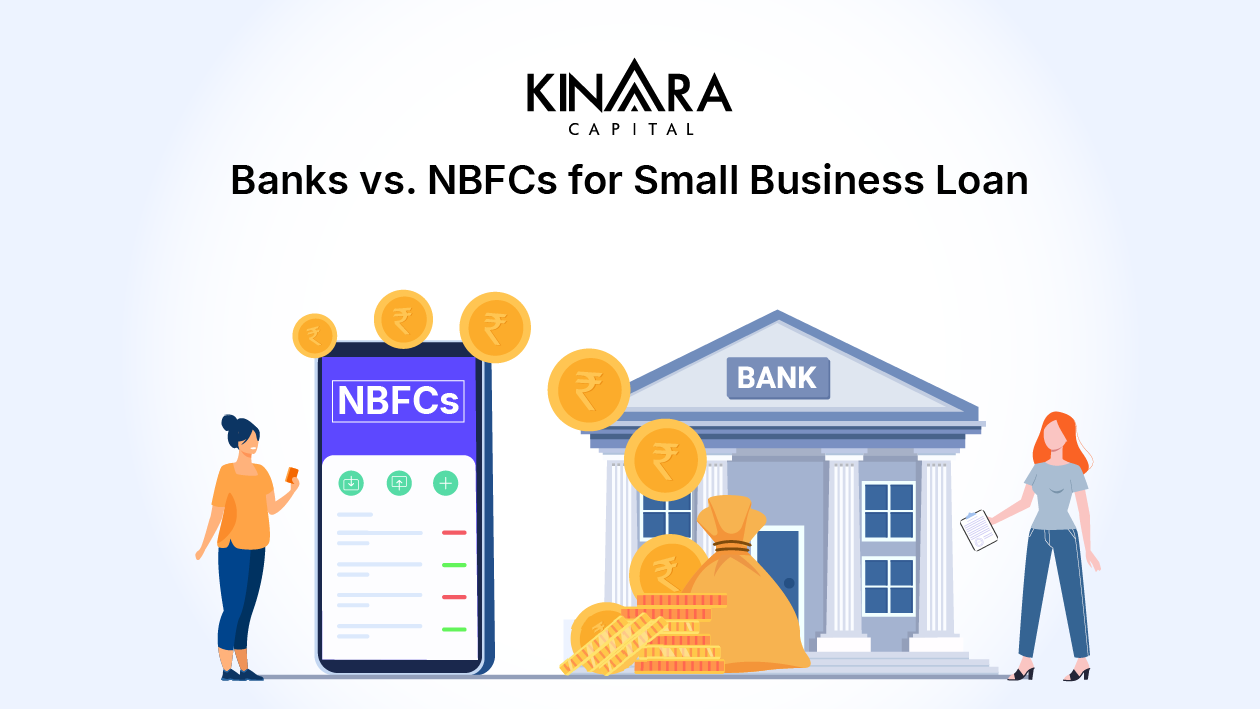
If you are a small business entrepreneur looking for formal credit, you have two options.
To take a small business loan online from a Non-banking Financial Company (NBFCs) or from a bank. However, since getting a bank loan can be difficult and cumbersome for small businesses, many NBFCs are there to support them, making it easier for micro-small-and-medium enterprises (MSMEs) to obtain a small business loan online.
Before taking a loan, it is vital to understand the two financial intermediaries offering them – NBFCs and banks.
Let’s look at the main differences between banks and NBFCs to help you understand which suits your needs better. These entities differ primarily in their regulatory frameworks, scope of services, and operational methods. Banks are regulated by the Reserve Bank of India (RBI) under the Banking Regulation Act. They can accept deposits from and offer a wide range of financial services, including savings accounts and checking accounts, a variety of loans, and investment products.
NBFCs are also regulated by the RBI but under different guidelines. There are some vital differences, like NBFCs not being authorized to accept demand deposits and are primarily focused on providing loans and credit facilities, asset management, and leasing services. While banks are typically more strictly regulated and offer a wider array of services, NBFCs often have more flexibility in their operations and can better cater to underserved segments like MSMEs.
The significant difference between bank and NBFC means that Micro, Small, and Medium Enterprises (MSMEs) seeking loans should be very careful when choosing one over the other. Business loan from bank have traditionally been more difficult to access for MSMEs. Whereas, business loan from NBFC is far more flexible and easily accessible. Read on to find out the benefits of NBFC loan and why NBFC loan is likely to be the right choice for MSMEs.
Borrowing money from a bank usually entails a lot of paperwork and a lengthy loan application process. Most NBFCs, on the other hand, allow for easy application, approval and disbursement of funds due to their minimal documentation requirements. With tech-enabled NBFCs like Kinara Capital, you will not have to go through any long screening procedures to avail of a small business loan online, and will therefore be able to get funds sooner.
The document requirements for NBFCs can be minimal and flexible. Whereas a bank requires much more proof and documents.
Many NBFCs look beyond the credit scores and have a less stringent requirement. Kinara Capital for instance uses technology and data to assess loan applications beyond just the credit score.
There are several benefits of NBFCs. With NBFCs, you can get a loan much quicker than from a bank. With a bank, the loan processing itself can take weeks/months, let alone the loan disbursement.
Both banks and NBFCs have their own sets of pros and cons. But if you are a small company seeking a small business loan online, then choosing an NBFC would be a better option. This is because the loan products offered by NBFCs are better customized to suit the loan requirements of small businesses. NBFCs make great small business lenders because they have a wider reach than banks do at the last mile, and a better understanding of what small businesses need.
When opting for an NBFC loan, be careful to choose the best NBFC for business loan. Kinara Capital is an RBI-registered NBFC that provides collateral-free business loans to small businesses, making it a great option for your credit needs. Moreover, less paperwork, limited documentation, and fast disbursement are some added advantages that you get with Kinara Capital. You can even get started with an eligibility check that only takes 1 minute!
NBFCs like Kinara Capital have a much more flexible and quick approval process thank banks because they use tech-enabled application and decisioning processes
There is a high risk of rejection for small businesses when seeking a loan from a bank. In addition to this, banks generally ask for collateral against a loan, which can be seized if you default on the loan.
Businesses can seek a loan from both banks and NBFCs, but it is advisable to limit the number of loan enquiries and avoid switching between lenders, as it can affect their credit score.
Businesses should consider the amount of paperwork required, the turnaround time, decisioning process, ease of repayment, and terms and conditions of the loan when choosing between a bank and an NBFC.
Business loans are often disbursed through electronic deposit, sending the amount directly into the bank account of the applicant.
Defaults can lead to penalties, and in cases where collateral is involved, it can even result in the asset being seized. Defaulting on a business loan also adversely impacts the credit score of the business or entrepreneur, which can affect their chances of getting a loan in the future.
